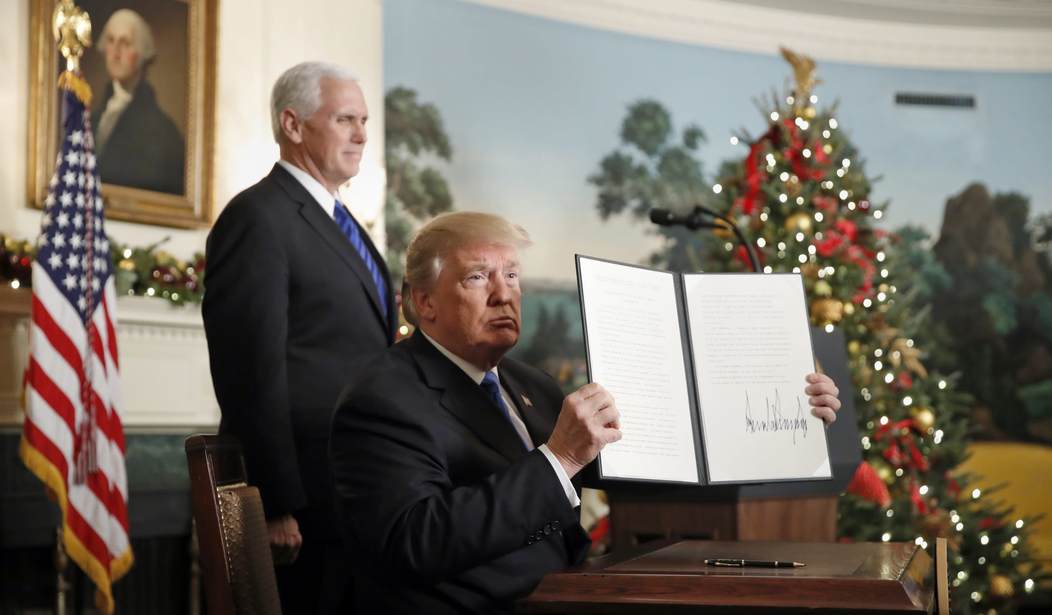WASHINGTON — President Trump today recognized Jerusalem as the capital of Israel, saying he wants to build an embassy there that’s a “magnificent tribute to peace” and stressing that Washington isn’t making a determination on the final status of the city in peace process negotiations.
Trump billed his announcement in the Diplomatic Reception Room of the White House as “the beginning of a new approach to conflict between Israel and the Palestinians.”
He said previous presidents who issued national security waivers to stall compliance with the embassy move as required by a 1995 law — Trump issued such a waiver in June — “made their best judgments based on facts as they understood them at the time” but “after more than two decades of waivers, we are no closer to a lasting peace agreement between Israel and the Palestinians.”
Recognizing Jerusalem as the capital of Israel is “in the best interests of the United States of America and the pursuit of peace between Israel and the Palestinians,” he said. “…Jerusalem is not just the heart of three great religions, but it is now also the heart of one of the most successful democracies in the world.”
“Jerusalem is today, and must remain, a place where Jews pray at the Western Wall, where Christians walk the Stations of the Cross, and where Muslims worship at Al-Aqsa Mosque.”
Trump said the State Department will begin “hiring architects, engineers, and planners” in preparation for the U.S. Embassy move from Tel Aviv.
“This decision is not intended, in any way, to reflect a departure from our strong commitment to facilitate a lasting peace agreement. We want an agreement that is a great deal for the Israelis and a great deal for the Palestinians. We are not taking a position of any final status issues, including the specific boundaries of the Israeli sovereignty in Jerusalem, or the resolution of contested borders. Those questions are up to the parties involved,” the president emphasized.
“The United States remains deeply committed to helping facilitate a peace agreement that is acceptable to both sides. I intend to do everything in my power to help forge such an agreement. Without question, Jerusalem is one of the most sensitive issues in those talks. The United States would support a two-state solution if agreed to by both sides,” he added. “In the meantime, I call on all parties to maintain the status quo at Jerusalem’s holy sites, including the Temple Mount, also known as Haram al-Sharif.”
Trump acknowledged there will “be disagreement and dissent regarding this announcement” — Arab allies have already sounded off against the move — “but we are confident that ultimately, as we work through these disagreements, we will arrive at a peace and a place far greater in understanding and cooperation.”
He called for “calm, for moderation, and for the voices of tolerance to prevail over the purveyors of hate.”
Vice President Mike Pence, who was standing behind Trump during the announcement, would be traveling to the region in the coming days to talk with leaders, he said.
Trump concluded by asking Mideast leaders “political and religious, Israeli and Palestinian, Jewish and Christian and Muslim, to join us in the noble quest for lasting peace.”
“God bless Israel. God bless the Palestinians. And God bless the United States,” he said.
House Foreign Affairs Committee Chairman Ed Royce (R-Calif.), who applauded the announcement, said that “relocating the U.S. Embassy should be done carefully, and in a way that advances our national security interests in a dangerous and unstable region.”
“Jerusalem is the capital of the State of Israel, something that the United States Congress has reaffirmed and a fact of history that cannot be denied,” said House Minority Whip Steny Hoyer (D-Md.). “Our country must play a constructive role in supporting Israel as it seeks the peace and security its people deserve by continuing to promote a two-state solution through direct, bilateral negotiations that will end any question of Jerusalem’s status.”
Sen. Marco Rubio (R-Fla.) called the announcement “an important step in the right direction — unequivocal recognition of Jerusalem as Israel’s capital will be complete when the U.S. embassy is officially relocated there.”
The American Israeli Public Affairs Committee called it “a historic day for the U.S.-Israel relationship” with the “momentous” announcement, and urged Trump to act “quickly” on the embassy move.
“The Jewish people have maintained a constant presence in Jerusalem, their holiest city, for more than 3,000 years. Israel declared the city its capital following its reestablishment in 1948,” AIPAC said in a statement. “When the United States ultimately relocates its embassy to Jerusalem, it will treat Israel as it does every other country with which we have diplomatic relations.”
J Street president Jeremy Ben-Ami argued that the announcement “could lead to violence, not only in Jerusalem but in Arab and Muslim states across the region — and potentially against U.S. diplomats and servicepeople” as well as alienate allies “whose support and engagement is needed to advance negotiations and achieve the administration’s stated goal of achieving comprehensive Israeli-Palestinian peace.”
“Like so much of what the president says and does, it seems designed purely to cater to his hard-right base among Christian evangelicals and a small minority of American Jews,” Ben-Ami said.
Michael Dickson, executive director of StandWithUs Israel, stressed that “this should not be seen as a real impediment to peace” because “in past negotiations there has never been any question that Jerusalem would remain the capital of Israel.”
“We hope that rather than turning to pointless acts of violence, Palestinian leaders and other regional players will accept reality and work together with Israelis to achieve a just peace,” said Dickson.









Join the conversation as a VIP Member